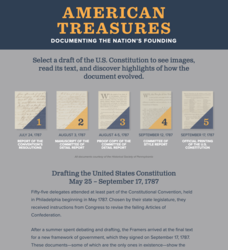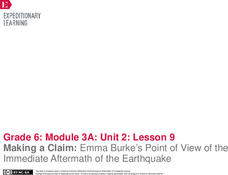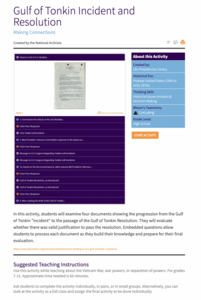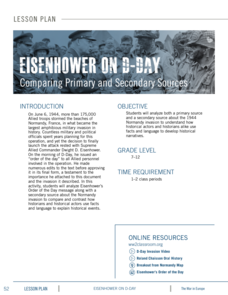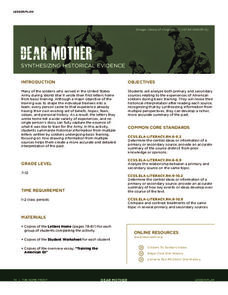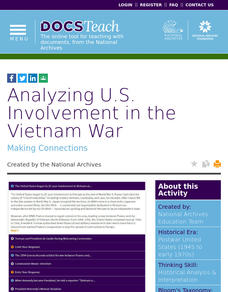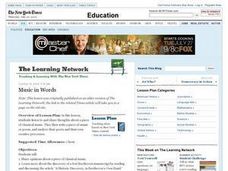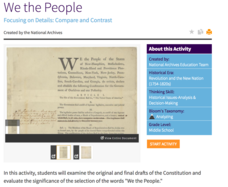DocsTeach
WWI America: Babe Ruth's Draft Card
Even the Great Bambino wasn't above suspicion during World War I. An eye-opening activity explores America's greatest pastime through the lens of government officials during WWI. Academics examine Babe Ruth's draft card to understand how...
Curated OER
A Day of Infamy:Analyzing FDR’s Pearl Harbor Address
In 1941 FDR spoke out on the events at Pearl Harbor. The class will get to analyze word choice, word meaning, author's craft and structure by analyzing an actual draft of this speech. They will look critically at the words used,...
Curated OER
The New York City Draft Riots: A Role Play
This is a fun, thought-provoking lesson. Learners use census data from 1855, primary source documents, their historical knowledge, and information regarding the New York City Draft Riots of 1863 to construct and engage in a role-play....
DocsTeach
Analyzing the Gulf of Tonkin Resolution (Original Draft Resolution)
Breaking news, President Johnson addresses the nation! Scholars watch a video of President Johnson's address to Congress regarding the Gulf of Tonkin Resolution. The activity focuses on the motivation behind the resolution and the...
Curated OER
You're History
Students write personal histories. For this historical analysis lesson, students explore their own places in history as they read the diaries of others and write their own.
Center for History Education
Freedom for All? The Contradictions of Slavery and Freedom in the Maryland Constitution
Freedom for the few! An interesting lesson focuses on the Maryland Constitution and its lack of freedom for African Americans. Scholars examine the premise of freedom for all—which only extended to a limited few. Academics complete...
Curated OER
A New York Rioter Explains His Opposition to the Draft
In this primary source analysis worksheet, students analyze a letter from a New York rioter over the Conscription Act. Students respond to 3 short answer questions about the letter to the editor of the New York Times.
Curated OER
Who Fought for the Union?
Learners read New York Times articles, letters, and listen to songs written from a soldier's perspective during the Civil War in order to understand who was fighting in the Union Army. This is a great lesson, complete with weblinks,...
National Constitution Center
American Treasures
Just how long did it take the framers to write the Constitution? What role did the drafting process play? Scholars examine various drafts from the Constitutional Convention to gain a better understanding of its formation. Interactive...
EngageNY
Making a Claim: Emma Burke’s Point of View of the Immediate Aftermath of the Earthquake
Sharpen those pencils; it's time to write! Scholars begin writing the first body paragraph of their literary analysis essays. Additionally, pupils use graphic organizers to analyze a character's point of view from Laurence Yep's...
DocsTeach
Two Versions of FDR's Infamy Speech
Historians follow FDR's Infamy speech from rough draft to the official address to the Senate. An intriguing activity compares and contrasts FDR's original speech to the official version. Academics also listen to FDR address the Senate....
Center for History Education
The Founding Fathers and the Constitutional Struggle Over Centralized Power
Believe it or not, the Constitution was America's second attempt at a democratic government. Academics travel back to the past to explore the shortcomings of the Articles of Confederation that would eventually lead to the Constitutional...
DocsTeach
Gulf of Tonkin Incident and Resolution
They sunk our battleship! An engaging activity focuses on the Gulf of Tonkin Incident and the sinking of the USS Maddox. Young historians learn how it increased tensions leading to the Vietnam War and read through a first draft of the...
Library of Congress
The Harlem Renaissance
The Harlem Renaissance brought forth many American art forms including jazz, and the writings of Zora Neale Hurston and Langston Hughes. Using a carefully curated set of documents from the Library of Congress, pupils see the cultural...
Curated OER
The Declaration of Independence: From Rough Draft to Proclamation
Students examine and analyze an unknown document (Jefferson's original rough draught of The Declaration). In this document analysis lesson, students compare the rough draught with the first printed version and work in pairs to analyze...
National Endowment for the Humanities
The Argument of the Declaration of Independence
When in the course of a course on historic American events, it becomes necessary for learners to examine, with decent respect, the Declaration of Independence, it becomes evident that there are six separate and equal parts of that...
National WWII Museum
Eisenhower on D-Day: Comparing Primary and Secondary Sources
Dwight D. Eisenhower's message to troops for D-Day is iconic. Individuals examine Eisenhower's words and compare that to historians' understanding of the epic events of that day using primary sources, an essay, and a Venn diagram to...
National WWII Museum
Dear Mother: Synthesizing Historical Evidence
It's one thing to read history, it's another to live it. Pupils examine secondary and primary sources that detail the training of soldiers before deployment. Then, they consider the impact of primary sources on how they understand the...
DocsTeach
Analyzing US Involvement in the Vietnam War
War: unavoidable or a necessary evil? A thought-provoking activity explores the United States' long involvement in the Vietnam War as well as the aftermath. Scholars research and summarize primary documents and complete online worksheets...
Center for History Education
Democratic Ideas of the 1776 Maryland Constitution
1776 was a year of political upheaval in the American colonies. Academics examine the Maryland Constitution to understand the desire to break with Great Britain. Young historians learn about Maryland's efforts to extend rights to its...
Center for History Education
Breaking the Great League of Peace and Power: The Six Iroquois Nations During and After the American Revolution
What happens when you can't remain neutral? An informative lesson explores the impact of the American Revolution on the Iroquois Nations. Scholars learn about the six Iroquois nations and their treaty with the newly formed American...
Curated OER
Music in Words
Your class can build strong, well-represented opinions about the music they hear. They listen to, and share thoughts about, a piece of classical music. Then they write a piece of music or a poem, and analyze their peers' work and their...
EngageNY
Making a Claim: Moon Shadow’s Point of View of the Immediate Aftermath
Body paragraphs are the building blocks of every essay. Pupils view and discuss a model essay using a rubric to evaluate one of its supporting paragraphs. Next, scholars use what they've learned to continue drafting their own literary...
US National Archives
We the People Focusing on Details: Compare and Contrast
Even the most inspiring documents in American history had to go through a few drafts before they were ready for publication. Reinforce the importance of the writing process, as well as the collaborative nature of democracy, with an...










